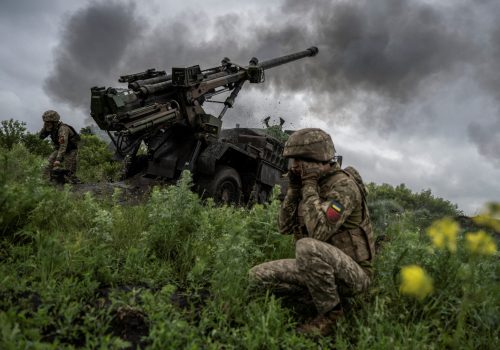
The new Ukraine will be a country worthy of its heroes

People often talk about achieving strength through adversity. In Ukraine, this is the everyday reality for millions of people. Over the past sixteen months, Ukrainian courage has stunned the world. This is not just a matter of resilience; Ukrainians know that we face destruction if we do not win.
Thanks to Ukrainian bravery and determination, almost nobody now doubts our ability to survive the war and defeat Russia’s invasion. However, many international observers are now starting to ask a new question: What will Ukraine do next?
I was recently in my hometown of Chernihiv. Russia tried to seize it in the first weeks of the full-scale war. For a period, the city was surrounded. One year later, Chernihiv is humming with activity. Ruins are gradually being rebuilt and businesses are working. During my trip, I talked to a local entrepreneur, Andrii, who owns a small store. He donates half of his profits to the Ukrainian military. Andrii asked me: “Of course, we will win, but what happens next? How will the country develop?”
I answered him and I can answer the whole world. We have a clear vision of what Ukraine must become and how to achieve it. Our plan for Ukraine has three pillars: security, freedom, and drive.
Subscribe to UkraineAlert
As the world watches the Russian invasion of Ukraine unfold, UkraineAlert delivers the best Atlantic Council expert insight and analysis on Ukraine twice a week directly to your inbox.
-
-
-
This field is for validation purposes and should be left unchanged.
Security comes first. All other efforts will be futile without this key ingredient. Ukraine needs a strong army to ensure the safety of our people and our economy. This is also the only way to make sure NATO’s eastern border remains secure.
Freedom is the second pillar. This is a central aspect of Ukraine’s European identity. As a nation, we stand for human rights and against international aggression. The new Ukraine will be a place where citizens and businesses have the freedom to innovate and succeed. We aim to remove unnecessary barriers to business development while ensuring inclusion and equality through social policies.
The third pillar is drive, shaping our goal for dynamic growth. We want Ukraine to become a global competitor and contributor, not a state dependent on others. By attracting investment and promoting innovation, Ukraine will become a new engine of European economic growth.
Ultimately, Ukraine’s goal is to join the Trillion Dollar Club. We need to finance a strong army of 500,000 personnel and a highly developed defense sector, as well as social services, education, and healthcare. A GDP of $1 trillion will enable ample funding for these sectors without imposing a critical burden on the budget.
At present, we see an investment potential in the region of $500–900 billion toward the rebuilding of Ukraine over the next 20 years. Additionally, replacing Russian and Chinese exports to EU and G7 countries could generate very large volumes annually.
Eurasia Center events

The construction industry and infrastructure development are top priorities. Currently, the damage inflicted by Russia on Ukraine’s residential sector alone amounts to over $54 billion. Reconstruction will require a significantly larger investment, creating unprecedented challenges and opportunities for the entire sector. We envisage a generational infrastructure upgrade that moves Ukraine away from the post-Soviet model and toward a modern European approach.
In the longer term perspective, we intend to rely on sectors where Ukraine already has proven potential and can offer globally competitive solutions. This includes food security, green transition, high-end technology, and industry.
We are committed to participating in the green transition, which is essential for Europe. This will make it possible to replace Russian energy resources. Our understanding of the green transition goes beyond energy to include the development of green metallurgy and a shift toward green logistics. Furthermore, Ukraine’s large reserves of strategic minerals position us as a major player in the production of lithium-ion batteries and nuclear fuel. The availability of resources provides an opportunity for high-tech production, opening the way for the EU to replace supplies from China.
Industrial development will generate demand for technological solutions and innovation. We expect to see a new boom in the Ukrainian IT sector, as well as the emergence of sectoral R&D centers capable of meeting the needs of other industries and the digital economy.
We are focused on technological development, but we are also very much aware that 350 million people are currently facing starvation worldwide. We aim to boost food security and become a food provider for 600 million people globally.
None of the above would be possible without the people who will make it happen and for whom all of this is intended. We aim to create conditions for millions of Ukrainians to return home and to persuade others to relocate to Ukraine by implementing attractive social policies and citizenship rules.
Simultaneously, we need to do the same for investors. The task we face is enormous. Ukraine’s record annual foreign direct investment (FDI) total remains the $11 billion received in 2007. We must attract at least that amount every single year for the next two decades.
We understand that investors need to see tangible results not just ambitious plans. Key steps include reform of Ukraine’s law enforcement agencies and courts, along with the establishment of strong and independent regulators. If successfully implemented, this will provide an institutional framework to ensure fair play and anti-corruption policies.
Setting up a business in Ukraine will become easy. We will simplify and digitize all processes involved in the creation of a new business, from construction permits and environmental regulations to turnkey utilities connections. We will reform monetary, tax, and labor policies by revising rates and tariffs and liberalizing the labor market. Ukraine will become one of the most convenient places on the planet to do business.
Ukraine’s future goes beyond sectoral growth. We envision ourselves as an integral part of the European community and a driving force for global development. We will contribute to international security, propose solutions for shared challenges, and establish good governance practices.
Over the last 10 years, Ukraine has already made significant progress toward countering corruption. Further advances are crucial as we seek to become a NATO member to protect our nation, and as we pursue EU membership to open up new business opportunities and consolidate reforms.
There is no alternative for us. Ukrainians must turn these ambitions into reality to ensure the country’s future safety and preserve freedom. Otherwise, Russia will remain a threat and will inevitably make another attempt to destroy Ukraine.
We call on all Ukrainians to return home and invite the global community to join us on this transformative journey. We invite them to invest in our resilient nation and to become shareholders in the prosperity that Ukraine’s success will surely bring. This is more than a national task; it is a global call to action. It will show how ordinary people in extraordinary times can turn adversity into strength.
Yulia Svyrydenko is Ukraine’s First Vice Prime Minister and Minister of Economic Development and Trade.
Further reading
The views expressed in UkraineAlert are solely those of the authors and do not necessarily reflect the views of the Atlantic Council, its staff, or its supporters.

The Eurasia Center’s mission is to enhance transatlantic cooperation in promoting stability, democratic values and prosperity in Eurasia, from Eastern Europe and Turkey in the West to the Caucasus, Russia and Central Asia in the East.
Follow us on social media
and support our work
Image: A serviceman of the 68th Oleksa Dovbush Separate Jaeger Brigade checks a national flag installed on a house of culture in the newly liberated village of Blahodatne, amid Russia’s attack on Ukraine, near the front line in Donetsk Region, Ukraine June 17, 2023. (Radio Free Europe/Radio Liberty/Serhii Nuzhnenko via REUTERS)
